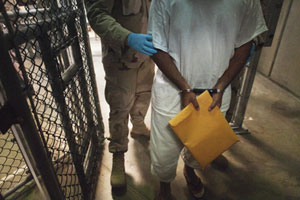Gitmo challenges could endanger half of convictions
By Chisun Lee in ProPublica
Decisions on two legal challenges to the Guantanamo military commissions system, both expected this summer, could undo half the convictions won so far before the tribunals and disrupt a number of pending cases.
The appeals of two 2008 convictions attack several core aspects of the young trial system. One potentially explosive argument is that the most commonly charged offenses — conspiracy and providing material support for terrorism — are not war crimes that can be tried in a military court.
The government insists there is longstanding precedent for prosecuting these acts through military justice. “Terrorism, though perhaps often by other names, is undoubtedly a war crime,” Edward White, a Navy lawyer who represents the government in one of the appeals, wrote in a brief. Violators, he added “were historically liable to be shot immediately upon capture.”
Attorneys for the appellants, however, say the U.S. is going too far. “There’s no other country in the world that recognizes material support for terrorism as a war crime,” said Joseph McMillan, who represents Salim Ahmed Hamdan, a Yemeni challenging a 2008 conviction. It’s a civilian offense that can be tried only in a civilian court, McMillan contends.
Whatever the U.S. Court of Military Commission Review decides, the loser can appeal, potentially all the way to the U.S. Supreme Court. But the rulings would have broad effect in the meantime, said White, chief of appeals for the prosecution in the Defense Department’s Office of Military Commissions, providing “important system-wide precedent.”
This is Hamdan’s second challenge to the Guantanamo commissions. His first, to the tribunals as set up by President George W. Bush, resulted in a 2006 Supreme Court decision invalidating the system before he could be tried. After Congress created the current commissions, he was convicted for providing material support as a driver to Osama bin Laden. Though he now lives free in Yemen, having completed his sentence, he is appealing again “to clear his name,” said McMillan.
The second appeal stems from the conviction of another Yemeni, Ali Hamza al-Bahlul. He remains at Guantanamo after being sentenced to life in prison for committing conspiracy, providing material support for terrorism, and soliciting murder as a publicist for al-Qaida.
The fate of the Bahlul and Hamdan cases could affect the paths of many others.
Two other men have been convicted in the Guantanamo commissions for offenses that the appeals call invalid. Ibrahim Ahmed Mahmoud al-Qosi, a Sudanese citizen accused of serving as an al-Qaida cook, bodyguard and driver, pleaded guilty this month to conspiracy and providing material support. David Hicks pleaded guilty in 2007 to providing material support and served a short sentence, before being released in his native Australia.
Hicks is reportedly considering an appeal. “The law that he eventually pleaded guilty to was not actually an international war crime at all,” his former lawyer recently told the Australian Associated Press.
Nine of the 12 detainees who remain at Guantanamo and are on the commission case list are accused of material support, conspiracy, or both. (This excludes the five suspected Sept. 11 co-conspirators, who are on the list but are currently set for civilian prosecutions.) There’s been no movement to prepare for trial in many cases on the list, a Pentagon spokeswoman said.
It’s not clear how the war crimes challenge would fare at the nation’s highest court. Four of the five justices who ruled for Hamdan in 2006 concluded that conspiracy was not a war crime, but the composition of the court has since shifted. The fifth, Anthony Kennedy, held off, saying Hamdan’s successful arguments on other points made it unnecessary to decide that issue.
In addition to denying their actions were war crimes, Hamdan and Bahlul make an array of other arguments. They say they were punished for conduct that was made illegal only after they acted, a violation of the Constitution’s prohibition on ex post facto laws. They also contend that establishing military commissions only for foreigners is unconstitutional discrimination.
Their cases illustrate a key concern of critics: The system touted by conservatives and embraced by the Obama administration as the most effective one for bringing certain detainees to justice is fraught with the potential to be undone, even years after trials conclude.
“The military commissions are an attractive option, because it’s a lot easier for the government to win,” said Stephen Vladeck, a national security law expert at American University who supports the detainees’ appeals and favors prosecution in civilian court. “But these are fundamental questions you just don’t have in the Southern District of New York.”
Three dozen detainees are set to be prosecuted in civilian or military court, according to an internal administration review completed in January and recently published by the Washington Post (PDF).
One solution for the government might be to strike plea agreements in which defendants waive their right to appeal. A Guantanamo prosecutor told The New York Times earlier this month that al-Qosi, by pleading guilty, had effectively given up that right. But the Pentagon wouldn’t tell us if the still-secret plea agreement contains a waiver.
“Whether or not the military commissions are constitutional is a question that will take years to answer,” said McMillan. “If they’re struck down by, ultimately, the Supreme Court of the United States, in various respects, the government is back at Square 1.”
























Comments